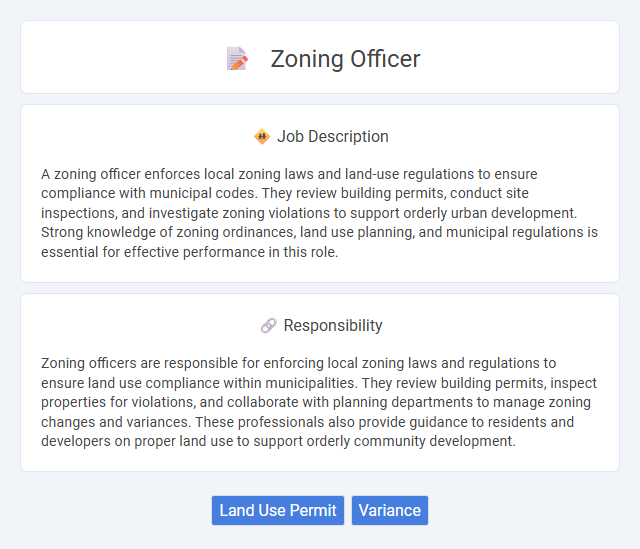
A zoning officer enforces local zoning laws and land-use regulations to ensure compliance with municipal codes. They review building permits, conduct site inspections, and investigate zoning violations to support orderly urban development. Strong knowledge of zoning ordinances, land use planning, and municipal regulations is essential for effective performance in this role.
Individuals with strong attention to detail and an interest in urban planning or law enforcement are likely suitable for a zoning officer position. Those who excel in communication and conflict resolution may find the role fulfilling, as it often involves explaining regulations and addressing community concerns. People who struggle with routine inspections or interpreting complex codes might find this job challenging.
Qualification
Zoning officers typically require a bachelor's degree in urban planning, public administration, or a related field, with certifications like the American Institute of Certified Planners (AICP) enhancing job prospects. Experience in land use regulations, zoning laws, and geographic information systems (GIS) is essential for effective enforcement and review. Strong analytical skills, attention to detail, and knowledge of local, state, and federal zoning codes are critical qualifications for success.
Responsibility
Zoning officers are responsible for enforcing local zoning laws and regulations to ensure land use compliance within municipalities. They review building permits, inspect properties for violations, and collaborate with planning departments to manage zoning changes and variances. These professionals also provide guidance to residents and developers on proper land use to support orderly community development.
Benefit
A zoning officer likely provides significant benefits by ensuring community development aligns with local regulations, which may enhance property values and promote orderly growth. This role probably helps prevent illegal land use that could lead to costly disputes or safety hazards. Effective zoning enforcement might contribute to a more attractive, functional, and sustainable environment for residents and businesses alike.
Challenge
A zoning officer's role likely involves navigating complex regulatory frameworks and addressing frequent disputes over land use, which can be highly challenging. Balancing community development goals with legal constraints may require continuous problem-solving and strong communication skills. The probability of encountering resistance from developers and residents often makes conflict resolution a critical aspect of the job.
Career Advancement
A zoning officer plays a critical role in enforcing land use regulations, which offers a clear pathway for advancement into senior planning or municipal management positions. Gaining expertise in zoning laws, urban planning, and regulatory compliance can lead to roles such as zoning manager, planning director, or city planner. Professional certifications like AICP (American Institute of Certified Planners) significantly enhance career prospects and open opportunities in larger municipalities or private sector consulting.
Key Terms
Land Use Permit
A Zoning Officer plays a critical role in managing land use permits to ensure compliance with local zoning laws and regulations. They review applications for land use permits, verify that proposed developments meet zoning codes, and issue permits that regulate construction, landscaping, and property modifications. Accurate permit processing facilitates organized urban planning, protects community interests, and supports sustainable land development.
Variance
A zoning officer reviews and processes variance applications to allow exceptions from local zoning regulations, ensuring compliance with municipal codes and land use plans. They analyze factors such as property characteristics, neighborhood impact, and legal criteria to determine the appropriateness of granting variances. Their role includes coordinating public hearings, preparing detailed reports, and enforcing decisions to balance community development and property rights.
 kuljobs.com
kuljobs.com